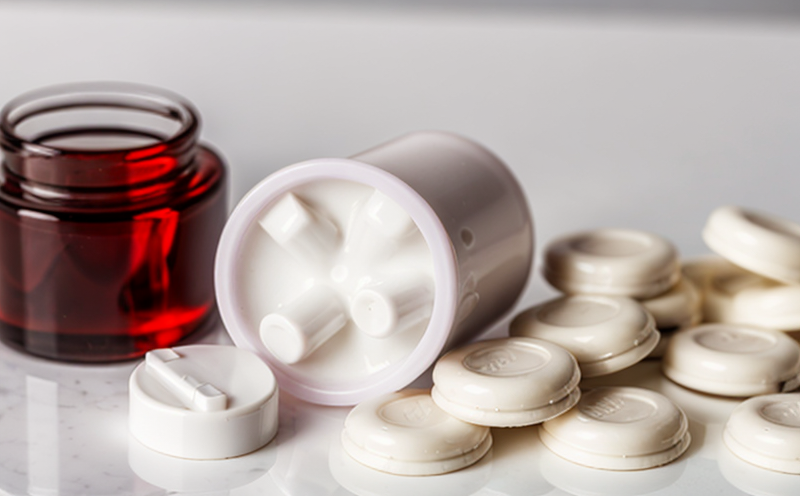USP Capsule Disintegration in Simulated Intestinal Fluid Testing
The USP Capsule Disintegration in Simulated Intestinal Fluid (SIF) testing is a critical procedure that ensures the pharmaceutical industry meets strict quality control and safety standards. This test evaluates how quickly capsules break down under conditions meant to mimic the digestive environment of the small intestine. Proper capsule disintegration is essential because it directly impacts drug efficacy, bioavailability, and patient tolerance.
During this process, a sample of oral solid dosage forms (primarily hard gelatin capsules) is placed in a specialized apparatus containing SIF. The SIF simulates the acidic conditions found in the small intestine. Over time, the capsule's integrity is monitored by recording the release of its contents at specific intervals. The test adheres to USP 1 methods and guidelines which specify precise temperature, pH levels, and time points.
This testing ensures that the drug product will be readily available for absorption into the bloodstream once ingested, thereby enhancing therapeutic outcomes. Non-compliance can lead to suboptimal efficacy or even adverse effects if the capsule does not disintegrate adequately within a reasonable timeframe.
The procedure is particularly important in ensuring compliance with regulatory requirements and quality standards set by various global authorities like the USP, WHO, and FDA. It plays a crucial role in validating that the dosage form meets bioequivalence criteria as per relevant standards.
Understanding the factors influencing disintegration times, such as capsule composition, coating thickness, pH of SIF, temperature, and agitation rate, is vital for optimizing product performance. By conducting thorough tests, manufacturers can identify potential issues early in development or during manufacturing processes.
The testing process itself involves placing a predetermined number of capsules into the test apparatus filled with SIF. The apparatus then agitates the mixture according to standardized protocols. At specified intervals (e.g., 30 minutes), samples are withdrawn and observed for complete disintegration, ensuring all contents have been released from the capsule.
Accurate results require precise control over environmental conditions, including temperature and pH levels within the SIF. Specialized equipment is used to ensure consistency in each test run. The reliability of these tests depends heavily on adherence to standard operating procedures (SOPs) that govern specimen preparation, apparatus calibration, and data recording.
The importance of this testing cannot be overstated as it directly influences patient safety and treatment efficacy. Ensuring proper capsule disintegration helps prevent issues such as incomplete drug release leading to ineffective treatments or delayed therapeutic benefits.
- Compliance with USP guidelines ensures consistent quality across batches.
- Precise control over temperature and pH levels guarantees accurate results.
- Standardized procedures reduce variability in test outcomes.
- Data integrity is maintained through digital recording systems.
In summary, the USP Capsule Disintegration in Simulated Intestinal Fluid testing serves as a vital quality assurance step that guarantees consistency and efficacy in oral solid dosage forms. This process not only adheres to strict regulatory standards but also enhances patient care by ensuring optimal drug delivery.
Why It Matters
The significance of USP Capsule Disintegration in Simulated Intestinal Fluid testing cannot be understated, especially within the pharmaceutical sector. This test ensures that oral solid dosage forms meet stringent quality standards and regulatory requirements, thus safeguarding patient safety and efficacy.
Firstly, it directly influences drug bioavailability by ensuring that the capsule disintegrates appropriately so that active ingredients can be absorbed efficiently into the bloodstream. Proper disintegration also enhances therapeutic outcomes, making medications more effective when taken as prescribed.
Secondly, this test helps in maintaining consistency across different batches of a product. By adhering to USP guidelines and using standardized procedures, manufacturers ensure that each batch performs consistently under similar conditions, reducing variability between lots. This consistency is crucial for meeting regulatory expectations and building consumer trust.
Thirdly, it plays a pivotal role in ensuring compliance with international standards such as those set by the USP, WHO, and FDA. Meeting these stringent requirements not only facilitates market access but also demonstrates commitment to excellence in manufacturing practices.
In addition to enhancing product quality and safety, this testing contributes significantly to reducing risks associated with suboptimal drug delivery or incomplete drug release. By identifying issues early in development or during production processes through rigorous testing, manufacturers can address potential problems before they impact end-users.
The importance of this test extends beyond just ensuring compliance; it also highlights the commitment towards providing safe and effective treatments for patients worldwide. Through meticulous attention to detail in conducting these tests, pharmaceutical companies contribute positively towards improving healthcare outcomes globally.
Why Choose This Test
The USP Capsule Disintegration in Simulated Intestinal Fluid test is an essential tool for ensuring the quality and safety of oral solid dosage forms. Here are several compelling reasons why you should choose this comprehensive testing:
- Comprehensive Assessment: It evaluates both mechanical integrity and dissolution behavior, providing a thorough assessment of capsule performance.
- Regulatory Compliance: Adherence to USP guidelines ensures that your products meet strict regulatory standards, facilitating easier market entry.
- Patient Safety: By ensuring proper disintegration, this test helps prevent issues like incomplete drug release or delayed therapeutic benefits, enhancing patient safety and efficacy.
- Consistency Across Batches: Standardized procedures guarantee consistent results across different batches of a product, reducing variability and improving reliability.
- Data Integrity: Digital recording systems maintain data integrity throughout the testing process, providing accurate and reliable results.
- International Standards: Compliance with international standards like those set by USP and WHO ensures global acceptance and trustworthiness of your products.
This test is not just about meeting regulatory requirements; it's about demonstrating a commitment to excellence in manufacturing practices. By choosing this robust testing methodology, you ensure that your oral solid dosage forms are of the highest quality, safe for use, and effective in delivering therapeutic benefits.





